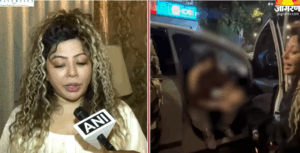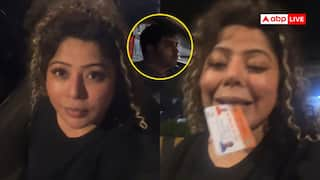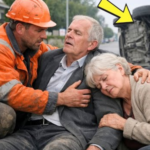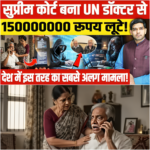Targeted in Mumbai: A Woman’s Ordeal Highlights Intimidation and Identity Politics

Introduction
Mumbai, India’s bustling financial capital, is often celebrated as a melting pot—where people from diverse backgrounds come together to chase dreams. But beneath the city’s cosmopolitan veneer, stories of intimidation, political muscle-flexing, and identity politics occasionally surface, shaking public faith in its openness and safety. One such incident recently came to light when a woman, a proud Maharashtrian herself, was targeted and harassed in a shocking road rage case that quickly escalated into a larger commentary on political power, gender, and belonging.
The Incident: Road Rage Turns to Nightmare
It started as an ordinary evening. The woman was returning home from Goregaon, driving her car through familiar city streets. Suddenly, another car rammed into hers. She brushed it off as a minor accident and continued driving, only to be hit again by the same car a little further down the road—this time with greater force and aggression.
Alarmed, she spotted two police officers nearby and immediately sought their help. “Please help me,” she pleaded, explaining that the man driving the other car appeared drunk and had deliberately hit her vehicle twice. The police accompanied her and managed to stop and confront the other driver.
What followed was both shocking and humiliating. The man, visibly intoxicated, was in such a disheveled state that, as the woman recalled, “he wasn’t even wearing any clothes properly.” She felt deeply ashamed and uncomfortable witnessing such behavior. It was unclear who had beaten or chased him earlier, but his condition was appalling.
Political Connections and Arrogance
As the police questioned the man, his response was not one of remorse. Instead, he arrogantly retorted, “Do you know who I am? Do you know who my father is? I am from MNS (Maharashtra Navnirman Sena).” He refused to share his name but repeatedly claimed ties to the MNS, a regional political party known for advocating Marathi identity and interests.
The woman recounted that, when confronted about his reckless driving and endangering three pedestrians as well, the man showed no regret. Instead, he boasted about his political connections, suggesting that his father was a high-ranking leader in the party and that she should take any complaints to Raj Thackeray, the party chief.
Police Response and Continued Abuse
Despite the man’s aggressive and indecent behavior, the police supported the woman and intervened as he hurled abuses at her—insults so vile that she could not even repeat them in public. He even attempted to physically assault her in front of the officers. The woman was left shaken, questioning her safety in her own city.
Pattern of Targeting and Intimidation
This was not the first time she had felt targeted. Just two days prior, she had filed a complaint after being harassed by individuals associated with MNS. The repetition of such incidents made her believe she was being deliberately targeted because of her outspoken stance on certain issues.
She explained, “My car is well-known. I work hard and have made a name for myself. People recognize my face and my car’s number. Why was my car singled out? And how did this MNS man show up again?” She added that if it had been a genuine mistake, the man would have apologized. Instead, he used his political clout to intimidate her.
Identity Politics and Hypocrisy
The incident exposed a troubling contradiction. The MNS, which often claims to stand for the rights of Marathi people, was now being accused of targeting a Marathi woman. “I am a Maharashtrian girl,” she said, “yet I am being targeted in my own city by people who claim to represent us.”
She described Mumbai as a mother that embraces everyone, regardless of caste or origin. “People come here from all over to work, to earn a living. I had only raised my voice to say, please don’t harass those who come here to do business. Let them work in peace.” For this, she was labeled a “Vibhishan”—a traitor, referencing the mythological character who sided with Rama against his own brother Ravana in the Ramayana. She rejected this label, insisting she respected all communities and that Mumbai belonged to everyone.

Escalation and Threats
The harassment didn’t stop with road rage and verbal abuse. After the incident, she was pressured by MNS members to apologize. “They brought 200 people to force me to say sorry. I was threatened that if I didn’t apologize, they would destroy my studio—my livelihood, where 40 to 50 people work, 80% of whom are Marathi.”
She questioned the logic of this intimidation: “These people claim to speak for Marathi interests, yet they are trying to ruin a Marathi woman’s business and threaten Marathi workers.”
Feeling Unsafe and Seeking Protection
The ordeal left her deeply traumatized. She admitted to being scared even at home, worrying every time the doorbell rang that someone might be there to harm her. Despite the threats and the emotional toll, she had not yet formally requested police protection, though she was still reeling from the trauma of back-to-back incidents.
She appealed to the public for support: “I ask everyone, please help me. Tell me what I should do to protect myself and my studio, where so many people—Marathi and non-Marathi—work together to earn a living. Why am I, a Marathi woman, being targeted like this?”
Wider Implications: Gender, Power, and Belonging
This incident is not just about road rage or one woman’s ordeal. It raises troubling questions about the misuse of political power, the dangers faced by outspoken women, and the ongoing challenges of identity politics in Mumbai.
The woman’s experience reveals how political affiliations can embolden individuals to act with impunity, believing they are above the law. It also exposes the vulnerability of women—even those who are successful, respected, and well-known—when confronted with organized intimidation.
Moreover, the episode highlights the hypocrisy of political groups that claim to defend local interests while simultaneously targeting their own community members for dissent or perceived disloyalty.
Community Response and the Way Forward
The woman’s story has resonated with many in Mumbai and beyond. Social media users, activists, and ordinary citizens have expressed outrage at her treatment and called for stronger action against those who use political connections to intimidate and harass.
There is a growing demand for accountability—not just for the individuals involved, but for the political parties whose names are invoked to shield wrongdoers. Many are urging the police and local government to ensure that women, regardless of their background, feel safe and protected in Mumbai.
Conclusion
The incident serves as a stark reminder that even in a city as dynamic and diverse as Mumbai, old fault lines of power, gender, and identity can still threaten individual freedom and safety. The woman’s courage in speaking out, despite threats and trauma, is commendable and should inspire others to demand justice and equality.
Her ordeal is a call to action: for society to stand with victims, for authorities to uphold the rule of law, and for political parties to rein in members who misuse their name. Only then can Mumbai truly live up to its reputation as a city for all—a place where everyone, regardless of gender or identity, can live and work without fear.
What steps can be taken to ensure the safety and dignity of women in Mumbai? Share your thoughts and help make the city safer for everyone.
News
उस दिन के बाद ऑफिस का पूरा माहौल बदल गया। अब कोई भी किसी की औकात या कपड़ों से तुलना नहीं करता था। सब एक-दूसरे की मदद करने लगे। अर्जुन सबसे प्रेरणा देने वाला इंसान बन गया। रिया भी अब पूरी तरह बदल चुकी थी। वह विनम्रता से छोटे काम करने लगी और धीरे-धीरे सबका विश्वास जीतने की कोशिश करने लगी।
चायवाले से मालिक तक: इंसानियत की असली पहचान सुबह-सुबह जयपुर शहर की सबसे बड़ी मल्टीनेशनल कंपनी के ऑफिस के गेट…
रिया फूट-फूट कर रो पड़ी। उसके सारे सपने, घमंड और अभिमान पल भर में टूट गए थे। बाकी सभी कर्मचारी भी कांप गए। सब सोचने लगे, “हे भगवान, हमने भी कल उस चायवाले की हंसी उड़ाई थी। अब अगर मालिक को याद आ गया तो हमारी भी छुट्टी हो जाएगी।”
चायवाले से मालिक तक: इंसानियत की असली पहचान सुबह-सुबह जयपुर शहर की सबसे बड़ी मल्टीनेशनल कंपनी के ऑफिस के गेट…
दूसरे दिन का माहौल चायवाले से मालिक तक: इंसानियत की असली पहचान
चायवाले से मालिक तक: इंसानियत की असली पहचान सुबह-सुबह जयपुर शहर की सबसे बड़ी मल्टीनेशनल कंपनी के ऑफिस के गेट…
चायवाले से मालिक तक: इंसानियत की असली पहचान
चायवाले से मालिक तक: इंसानियत की असली पहचान सुबह-सुबह जयपुर शहर की सबसे बड़ी मल्टीनेशनल कंपनी के ऑफिस के गेट…
I gave a drenched old man shelter in my home. The next morning, he offered to buy my house for $1. “I’m not joking,” he said. “I can’t explain, but you need to leave it immediately.”
I gave a drenched old man shelter in my home. The next morning, he offered to buy my house for…
शीर्षक: “शिखर पर अहंकार नहीं, इंसानियत टिकती है”
शीर्षक: “शिखर पर अहंकार नहीं, इंसानियत टिकती है” सुबह के दस बजे थे। शहर के सबसे आलीशान रेस्टोरेंट “एमराल्ड टैरेस…
End of content
No more pages to load






